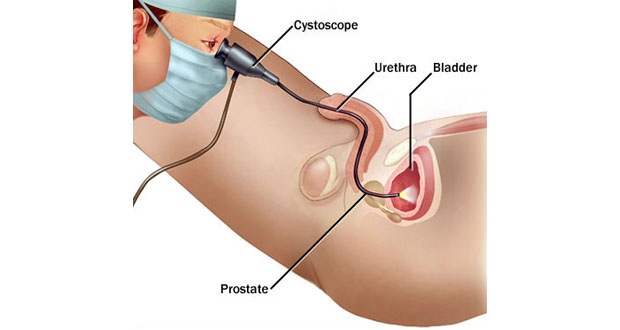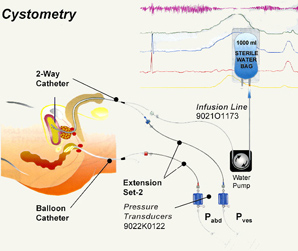- No special preparation is required and you should be able to return to normal activity afterwards.
- No admission is needed
- No need for starvation
- No need for anaesthesia.
The examination only takes a few minutes and you will be able to dress and use the toilet again.
Following a flexible cystoscopy you may experience the following:
- Discomfort or a burning sensation when passing urine – drink extra fluids for the next 2-3 days.
- Taking Citralka syrup may also help to relieve these symptoms
- You might pass urine more frequently for a few days.
- Your urine may be a little blood stained – drink extra fluids until this clears.
Urodynamics Study
What is a Urodynamics study?
It is a test which gives us more information about how your bladder is working and to find out what is causing your bladder problems.
Getting ready for this test:
- There is no need to fast for the test.
- A frequency/volume chart will be given. It is essential that you complete this chart and bring it with you to your appointment. This chart will provide important facts about your bladder size, how often you need to pass urine and any episodes of wetting.
- This chart is a very important part of your preparation for the test as this will help to find out what is the problem with your bladder. Fill it out as well as you can for three days.
- Please do not pass urine before the test so your bladder is full.
- The test will take about 45 minutes.
The Test:
- The doctor will take a medical history.
- Then you will be asked to pass urine into a special toilet that measures the amount and rate at which you pass urine.
- The doctor/nurse will then pass a small rectal tube into your back passage.
- A fine tube called a catheter is passed through your water passage into the bladder. This catheter is used to slowly fill your bladder with water.
- The tubes do not cause any pain but will cause an unusual feeling or mild discomfort.
- The doctor will ask you to cough every minute, this is to check for any leaks from your bladder.
- When your bladder feels really full you will be asked to pass urine.
- When the procedure is completed the tubes will be removed.
 Urologist in Chennai | Robotic Urologist in India | Chennai Urology
Urologist in Chennai | Robotic Urologist in India | Chennai Urology


